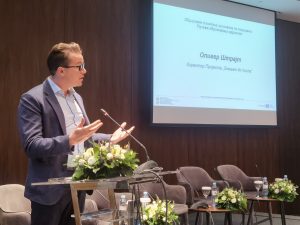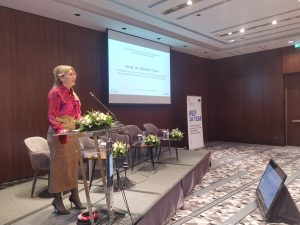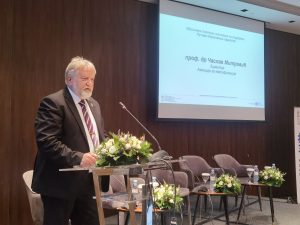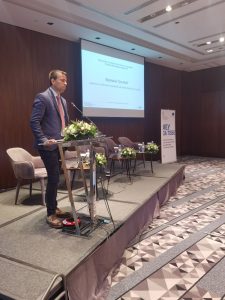Data-Based Education Policy: Adult Education Pathways
Conference Data-Based Education Policy: Adult Education Pathways was held at the Metropol Hotel in Belgrade on June 7, 2021, organized by the Ministry of Education, Science and Technological Development and the Qualifications Agency, with the support of the IPA 2014 Development of an integrated system of national qualifications in the Republic of Serbia.
The conference was organized in support of the members of the working groups formed by the Ministry of Education, Science and Technological Development with the task of preparing proposals for amendments to the Law on the National Qualifications Framework of the Republic of Serbia and the Law on Adult Education, that is, bylaws regulating detailed system and standard conditions for approving the status of a publicly recognized organizer of adult education activities (PROAEA) and standards for self-evaluation and external evaluation of PROAEA.
The introductory word at the conference was given by Vukašin Grozdić, advisor at the Office of the Prime Minister of the Republic of Serbia, assistant ministers Prof. Dr. Gabrijela Grujić, and Miloš Blagojević, Martin Klauke, Head of the II Sector of Operations, Delegation of the European Union to the Republic of Serbia, Prof. Dr. Časlav Mitrovic, Director of the Qualifications Agency and Barbara Rambousek, Director for Gender and Economic Inclusion, European Bank for Reconstruction and Development. On that occasion, the importance of adult education was emphasized as one of the key instruments for harmonizing education with the needs of the labor market, especially taking into account the strong technological and economic changes that modern society is facing.
The second part of the conference presented studies prepared with the support of the IPA 2014 Project, the “Knowledge to Work – E2E” Program, as well as with the support of the European Bank for Reconstruction and Development.
The results of the studies confirmed the necessity of improving the system of approving the status of PROAEA in the direction of greater flexibility of the procedure, as well as in the direction of providing continuous support to institutions interested in organizing adult education activities. Employers interested in active participation in the adult education system also need a special type of empowerment, especially in the area of conducting practical classes in a real work environment.
Experts pointed out that in order to timely and efficiently identify the changing needs of the labor market, it is necessary to strengthen educational institutions for the development of quality training programs and their adaptation to the needs of specific target groups of participants. Individualization of the training service accompanied by a quality career guidance and counseling service are the recommendations of experts who have analyzed the quality of the implementation of professional training.
Finally, a systematic approach is needed when it comes to the andragogical competencies of teachers (lecturers and instructors) – this need is being confirmed from year to year, and additionally gained importance with the implementation of the concept of lifelong learning.
The results of the studies presented at the conference, as well as the recommendations of the experts, will be the starting point for the work of the formed working groups, whose work is expected to begin in the coming period.
Methodology for taking exams for the verification of the professional competencies
Methodology for verification of the professional competencies
Methodology for the development of training programs based on Qualification Standards
The framewerk of andragogical competencies of teachers in adult education
The framework of andragogical competencies of teachers in adult education ppt
Evaluation of the PROAEA accreditation system
Report on the relation of quality of training and labour market outcomes











